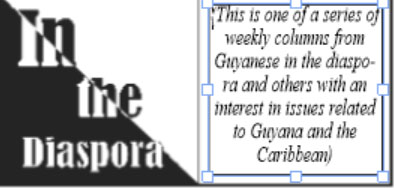By Lear Matthews
Lear Matthews is professor, State University of New York, Empire State College. A former lecturer at the University of Guyana, his recently published book is “English Speaking Caribbean Immigrants: Transnational Identities”. He writes on Diaspora issues.
In a previous article this writer suggested that cultural traditions embody the bedrock of a nation’s survival. Ironically, cultural heritage is also the virulent handmaiden of ethnic cleavage and racial tension invariably engineered by political jostling. The aftermath of elections and constitutional change in Guyana exemplify how tensions resurface, influencing the behaviour of civil society. History dictates that virtually any outcome of national elections is likely to threaten social cohesion and nation building. At a time of imminent economic transformation the consequences can hamper societal benefits including investors and resources for vulnerable groups. Today’s article highlights the impact of societal discord on children and appeals for ethnic tolerance. Ethno-political conflict affects children and adolescents emotionally and socially, and may cause families to emigrate. Diasporans who would like to contribute to nation building are also concerned about perceived danger.
Described as the “Land of Six Peoples”, an expression of its multi-ethnic heritage, this nation of rich natural resources, bio-diversity, majestic waterfalls, lush savannahs and pristine mountain ranges is admired for its prominence in the Caribbean and soon the world. Nevertheless, in contrast to such enviable attributes, simmering tensions exacerbated by political machination and crises of confidence in social institutions have long nestled therein. Professor Vibert Cambridge notes that the core ideas that nourish ethnic mistrust have remained unchanged. How is a nation with such exquisite natural beauty, brilliant minds and potential, repeatedly mired in the abyss of discontentment, which has unfortunately become the hallmark of the Guyanese experience? Tings gat fuh change for the sake of Guyana’s children.
There are several examples of persistent mistrust and conflict between two major ethnic groups, Afro- and Indo-Guyanese. The resistance to compromise regarding pre-election procedures and conflict following the 2020 elections exemplify familiar ‘ghosts of the past’ i.e. ethnic division and potential for violence. Children are particularly vulnerable in these situations. The US Country Report on Human Rights Practice found that physical and sexual abuse of children in Guyana has been common. This is exacerbated by politically motivated violence from which children are traumatized. Unabated, it leaves them vulnerable, affecting interpersonal relationships, mental health and educational performance.
The 2017 Guyana Diaspora Engagement Strategy document suggests that “although there are many positives to diversity, Guyana suffers from a lack of unifying religion, race, ethnicity or unique language… It is important to develop programs that instill a national identity based on unique Guyanese features that will promote unity”. However, it is difficult to establish a national community because of subcultures and divergent political ideologies, notwithstanding outside efforts to destabilize the country.
It is important to note that there are some juxtaposing ethnic communities and encouragement of cross-cultural celebrations such as Phagwah (Holi) and Mashramani, symbolic of efforts to unify. Social cohesion can be assured by focusing on what unites groups and not what divides them. When groups are accommodating to one another and work on common goals, understanding and reciprocal respect emerge, increasing tolerance and healthy competition. Respect for difference and forming alliances help to assuage conflict. This could reduce tensions and benefit a nation trying to manage the influx of unprecedented wealth.
Some political notables seem to believe that ethno-nationalism or personal gain should define the nation’s precepts for development. Furthermore, blaming ‘the other side’ without soul-searching is a futile exercise which exacerbates division. However, power sharing as a governing approach in Guyana seems to be an oxymoron, yet it is re-emerging as a possible solution. Perhaps a precursor to this approach is to establish the parameters of mutual responsibility and commitment to inclusion. Ultimately, the power of collective effort in the interest of nation building and survival is never in doubt. This is noteworthy in light of the unpredictable repercussions of the COVID-19 pandemic. The leadership should be guided by morality and love for country, ensuring a nation that is not steeped in divisiveness and corruption. In addition, collateral victimization of children and youth must be avoided. They deserve to be socialized without fear or indoctrination, but with respect for self and others, and genuine inculcation of ethnic, cultural and political history of Guyana which is woefully lacking.
Civility and identity issues begin in childhood. Therefore, there must be a unifying pathway for a well-prepared multiethnic generation. An earnest dialogue (perhaps including diasporans) about tensions, ethno-cultural disharmony and capacity building is essential, particularly as these affect children. Promoting unity with opportunities for our youth, buttressed by a well-monitored sovereign-wealth fund, ensures the preservation of gains from a possibly bounteous industry.





